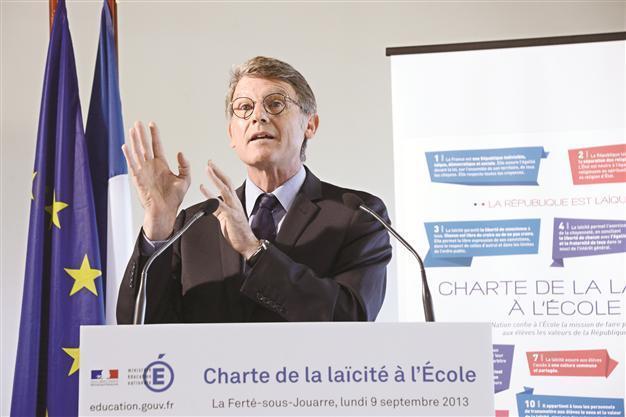France moves to toughen ban on religion in schools
PARIS - Agence France-Presse

French Education Minister Vincent Peillon speaks during a press conference at the Samuel Beckett college to unveil the secularism charter. AFP photo
France unveiled a new charter on Sept. 9 that was designed to reinforce rules banning religion from schools which have been a recurring cause of tension with Muslims and other faiths.The “Charter for Secularity in School,” is to be displayed in poster form in every state-funded school in the country in a move pioneered by the Socialist government’s education minister, Vincent Peillon.
The 15-point statement contains nothing new in legal terms.
Instead, Peillon says, it represents an attempt to promote better understanding, and more consistent enforcement, of long-established principles which have their roots in the anti-clericalism of the French revolution and the country’s 1905 law enforcing a strict separation of church and state.
Peillon’s initiative was greeted coolly by leaders of France’s five million Muslims, some of whom see the aggressive promotion of secularity as an assault on their culture and traditions. Recent years have seen a string of legal disputes arising from the exclusion from school of girls wearing headscarves in defiance of a 2004 law which prohibits the wearing of “ostentatious” religious symbols.
‘Allusions’
Dalil Boubakeur, the chairman of the French Muslim Council, said the charter’s emphasis on that law and to the equality of girls and boys amounted to “allusions” to Islam which would trigger concern in the community.
“Ninety percent of Muslims are going to have the feeling they are being targeted by this charter,” Boubakeur told AFP.
That interpretation was rejected by Peillon. “Secularity is about the equality of everyone in the Republic. There are those who think it is all about banning things. In fact it was what allows us to live together freely.” The charter starts out by emphasising that France “respects all faiths” and that the state is neutral in regard to them. It goes on to explain, in child-friendly terms, that the absence of religion from schools affords pupils the conditions to forge their own personality, exercise free will and become citizens in an environment free from pressure or proselytising.
In practice, that means that teaching staff must never give any indication of their religious (or political) convictions during lessons and that pupils cannot use their faith as a reason to challenge the content of the national curriculum, the manner of teaching or the rules of the school.
The notion of the “Ecole laique” (secular school) as one of the cornerstones of the Republic and a guarantee of the universal right to the freedom of expression and is one that is cherished by France’s intellectual elite. Outside minority faith communities, it also enjoys strong support among the population.The legislation has also caused anguish among France’s 30,000 Sikhs, whose male children are required by their faith to cover their hair.
















